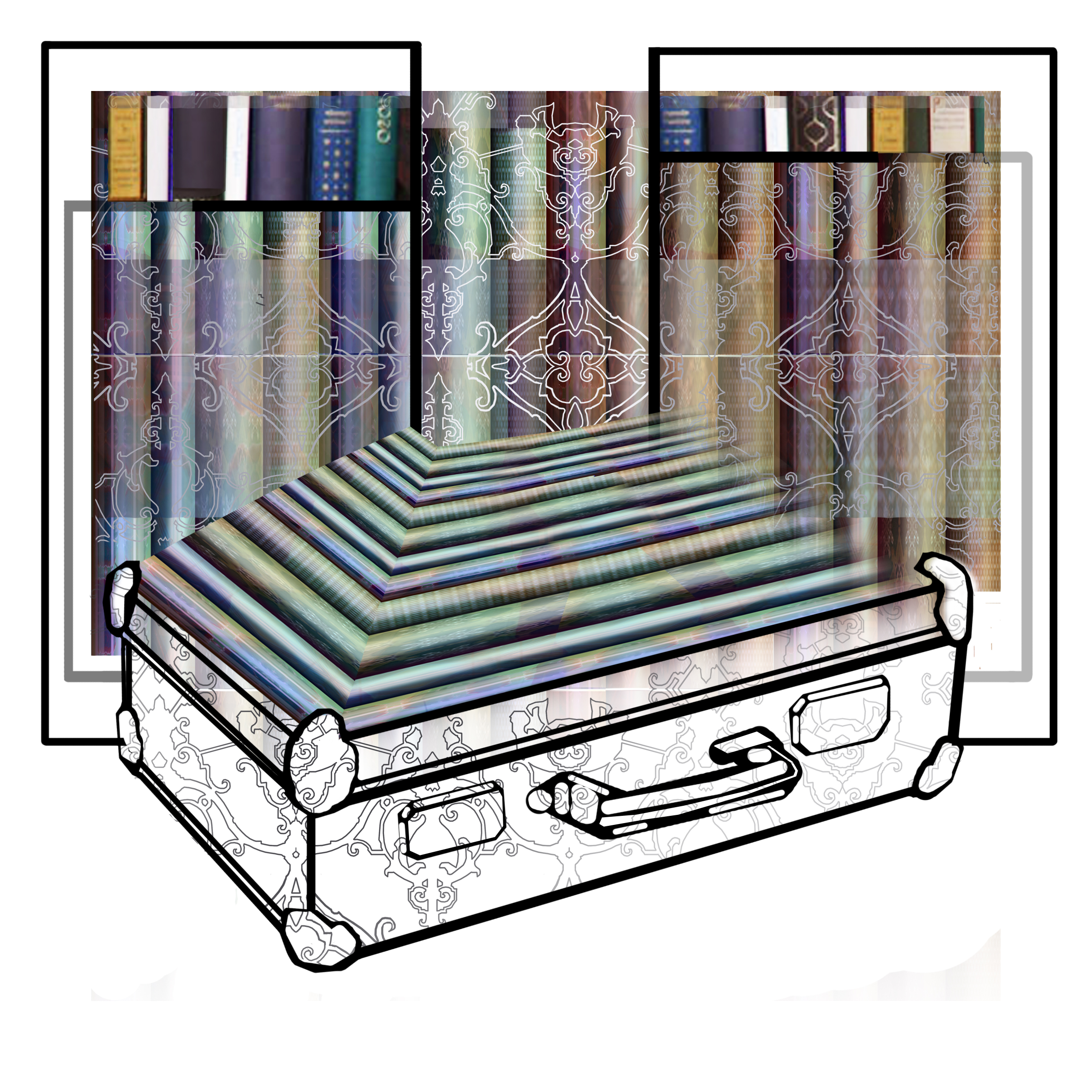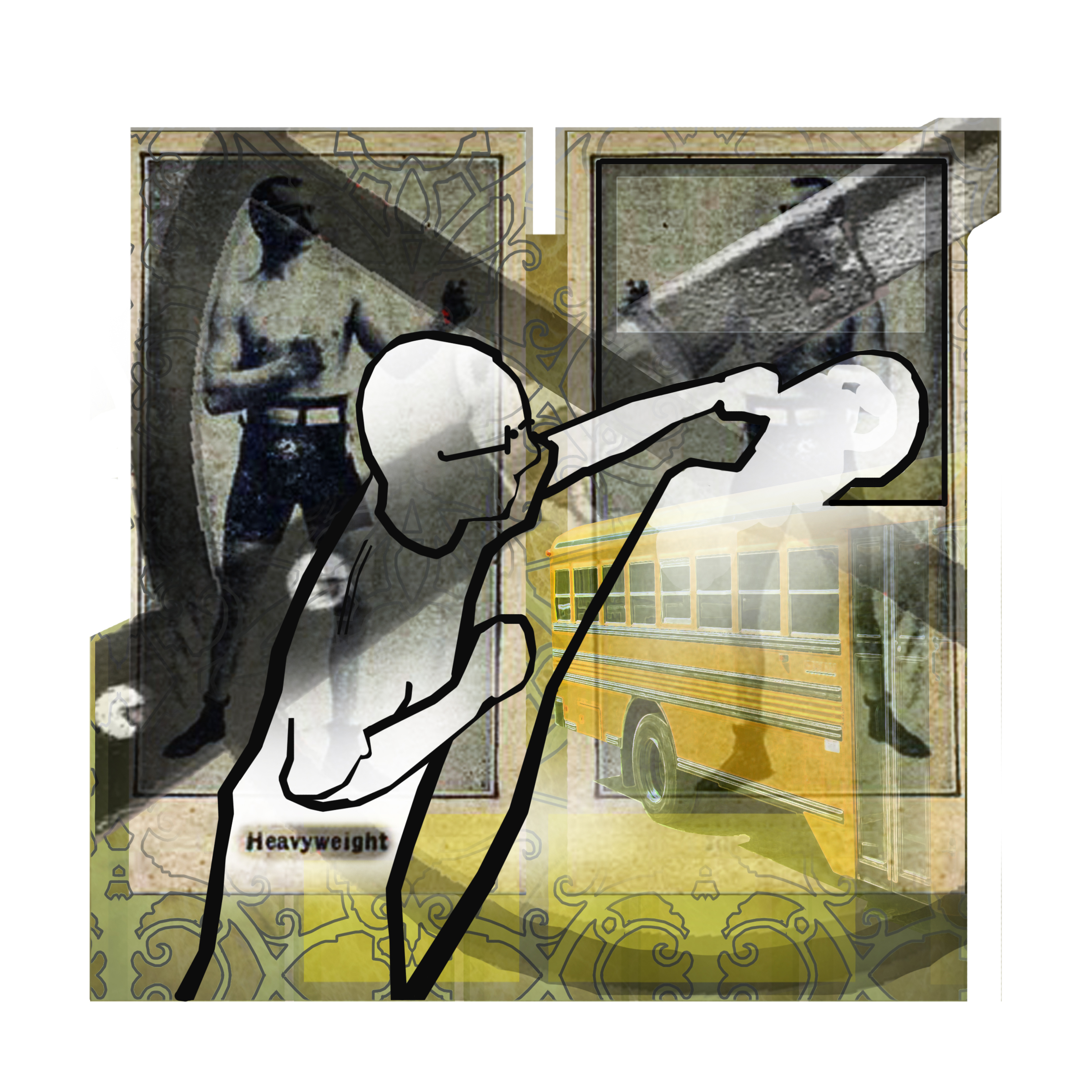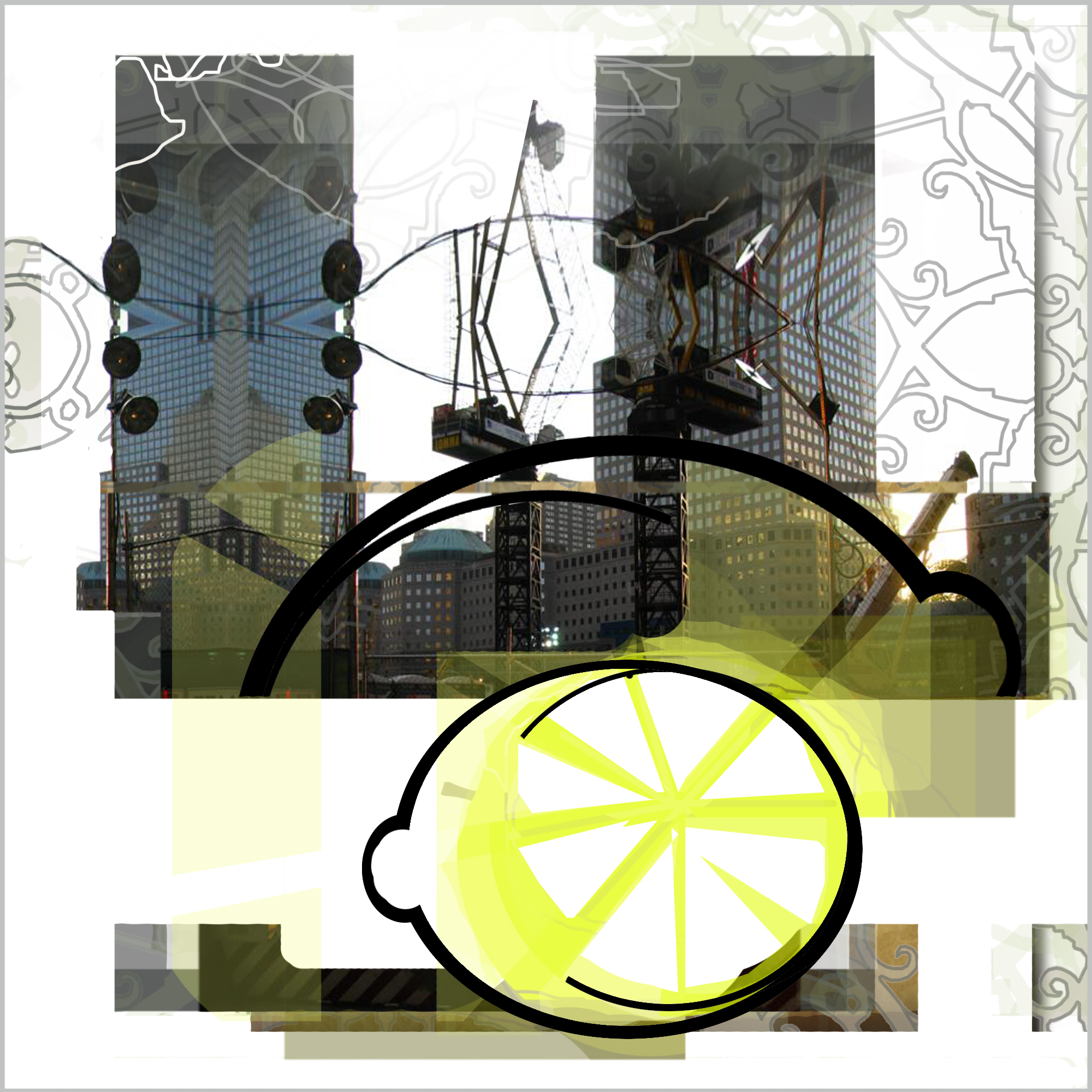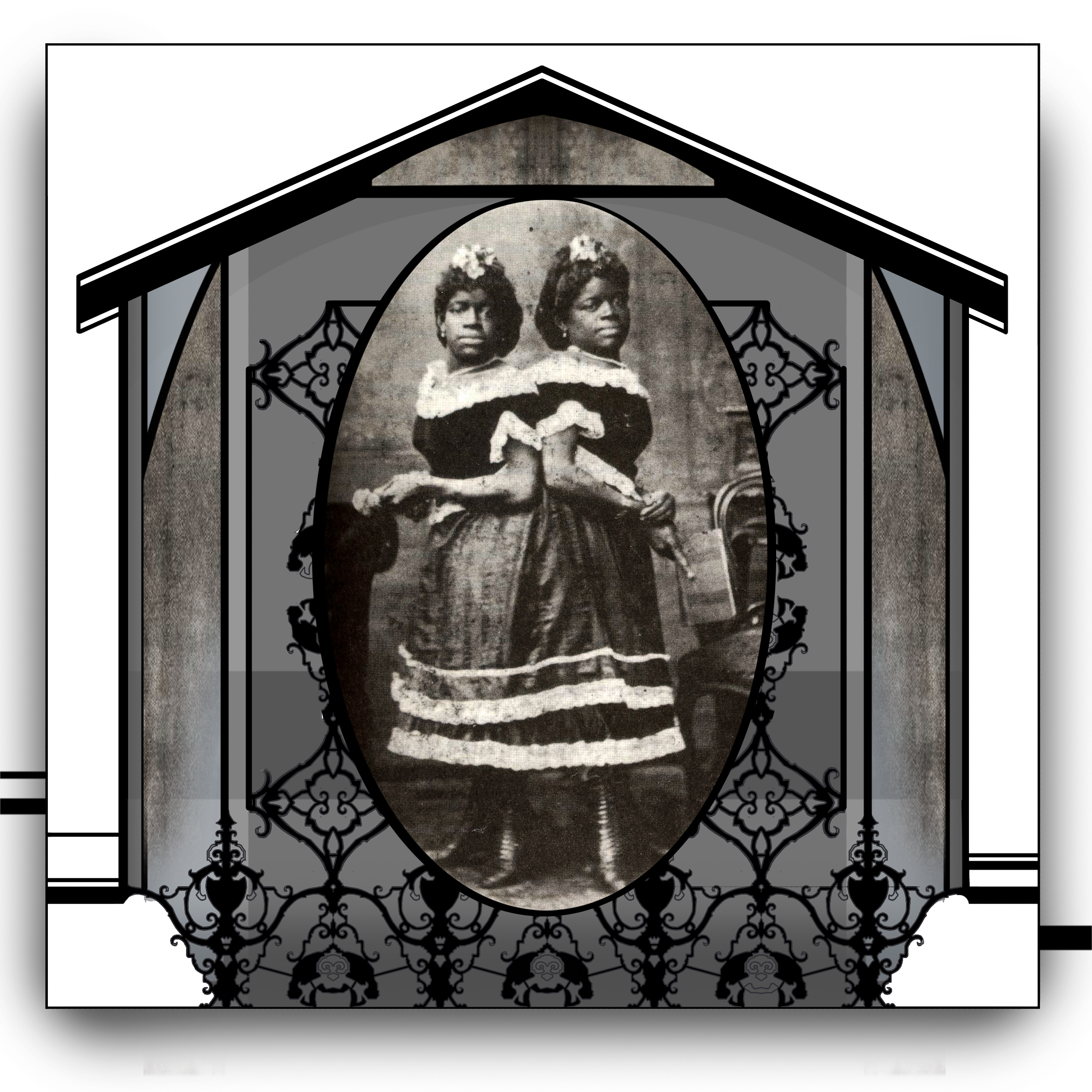
Illustration by Morgan Maurer, 2011
It had been years since El played a game of chess on an actual chess board with actual pieces, and even longer since he had chatted easily with a woman, and yet there he was, in the ornate living room of an old Victorian home in Lexington, Kentucky, seated in an overstuffed chair across from Tess, a tall-ish, athletic-looking woman of about his age, mid- to late-fifties, though he’d have guessed when he first met her that she was younger.
She sat across from him in another overstuffed chair, looking down to the slate table between them at a handsome antique chessboard and pieces. She wore faded blue jeans and a thin pale-yellow turtle-neck sweater that hid the loose folds of her neck, where, he had noticed the night before, her age did show. In her eyes he found a mix of intelligence and weariness he associated with successful women. He’d just explained that all the chess playing he’d done lately had been on a computer screen, with anonymous opponents from all over the world, and she’d said huh, as if it amazed her anyone would want to spend his time playing chess with someone he couldn’t see. They’d been talking like this, sharing little bits and pieces of their lives, for the past day and a half, since they’d been seat-mates on a flight out of New York to Roanoke, Virginia––a flight that had been diverted because of fog. They’d wound up in the Lexington airport late in the evening, and when flights there were grounded because of snow, they wound up sharing a cab to the same Bed and Breakfast a few miles from the airport, where they wound up sharing nightcaps in Tess’s room, followed by more easy conversation that lasted for hours and ended with them making love and falling asleep in each other’s arms.
In the morning, to El’s surprise, there was very little awkwardness. They’d risen, showered, dressed, and then gone down to breakfast chattering away, talking about everything in the world, from their histories and their lives to politics and science. It was as if neither of them could talk fast enough. Turned out, they both lived in TriBeca, relatively close to each other: El on North Moore Street, Tess on Leonard. They were both divorced, El for the six years, Tess for ten. El had been married for a dozen years before the divorce, Tess for more than twenty. They both had grown children: Tess, two girls and a boy; El, a son and a daughter. Tess worked in fundraising, El was in sales.
After breakfast, they’d retired to the living room and spent most of the rest of the day in front of an open fireplace, and every hour or so one or other of them took a chunk of wood from a stack on the red brick outer hearth and tossed it into the flames. Late in the afternoon, when it was clear there would be no flights out of Lexington until sometime the next day, the woman who ran the B&B, a grandmotherly figure with a balding head of gray hair and a belly that made her look impossibly pregnant, asked if they’d mind if she left them alone for awhile while she went to look after an elderly friend. Now it was late afternoon, the light outside gray and solemn, and they were alone in the house, midway through a chess game neither of them cared much about, a game that was meant only to provide an occasional diversion from their ongoing conversation.
Tess looked up from the chessboard, out a bay window overlooking a sloping hill and a trail that disappeared into a line of snow-covered trees. “Let’s go for a walk,” she said, “before it gets dark.”
“Seriously?” El looked out the window again, as if he might have been missing something. The snow was still coming down, though lightly, and there looked to be a foot or so on the ground. The scene was peaceful if dark––gently falling snow over fields and woods––until a gust of wind sent furious white swirls spinning into the trees.
“You’re a big guy,” Tess said. “You can take it.”
El said, “Looks awfully cold out there,” and then opened his arms and gazed down at himself, at the thin, dressy slacks and black shoes, at the white cotton shirt with fine blue stripes, more appropriate for a board meeting than a hike in the snow.
“She’s got everything,” Tess said. She jumped up from her chair, as if officially announcing the game of chess was over, and she motioned for El to follow her. “Look at this.” She opened a door off the foyer to reveal a closet stuffed full of winter gear in a variety of sizes: coats, scarves, boots, hats, gloves, multiples of everything. “Elwood,” she said, using his full name, teasing a little. “They have actual real woods here in Kentucky. Right out there, in fact.” She pointed out the bay window.
El wrapped a long green scarf around his neck and foraged through a line of winter coats, looking for something that might fit him. He was six-one and bulky, with thick legs and heavy thighs. “Did I tell you I played point guard in college?” he asked as he tried on the only coat he could find that would reach down to his waist.
“Really?” Tess said. “I love basketball. Were you good?” Then she added, quickly, “I mean, you must have been good––”
El laughed and said, “That’s all right.” He was struggling to get the coat zipper up over his belly. “I was too small to get much playing time, but when they let me on the court, I usually did pretty well.”
“Did you like playing?”
“Loved it,” El said, and left it at that. He took a step back and opened his arms. The coat was too small for him, but he’d managed to get it zipped up and buttoned.
“You need to put a second pair of pants on over those,” she said. “Do you have anything a little sturdier?”
“Pants?” He shook his head. “I’ve got another pair of dress slacks.”
“Better go get them,” she said. “The wind will whip right through those; might as well be naked.”
El said, “Fine. I’ll be a well-dressed woodsman,” and he went back up to the bedroom, where he found a heavier pair of socks and put them on over the first pair, and then struggled into a second pair of pants.
Before leaving the room, he looked at himself in a free-standing, full-length mirror. As he expected, he looked ridiculous: a big guy with a round face framed by a full head of gray hair, wearing a too-tight winter coat and a long green scarf with gray dress slacks, two pair. He smiled, amused at the figure he cut––and then his thoughts took a quick turn back to basketball. He had been modest with Tess. He hadn’t told her that in high school he’d been the team’s leading scorer sophomore through senior year, and that one college scout who watched him play said he had the sweetest three-point shot in the region. Still, he had no offers from Division I schools. Too small. He’d heard it over and over, through high school and college. Too small. After high school, he traveled halfway across the country to play for Oklahoma Wesleyan, a good Division 2 basketball school––only to get limited playing time, because, of course, he was too small to compete against the bigger, stronger players in the league.
Too small. The words were lodged somewhere deep inside him like slivers of heat. He told Tess he loved basketball, but his feeling for the game, back then at least, was something more than that. His whole life was immersed in basketball. When he wasn’t playing, he was practicing. When he wasn’t practicing the game, he was thinking about it. He did only what he had to do to get through the academics in high school, and the same in college. He was a good basketball player, and he believed that would be his future. In high school, he believed he’d be recruited by a division 1 team and go on to play in the pros. When that didn’t happen and he went on to a division 2 school, he believed he’d be noticed there and go on to play in the pros. When that didn’t happen, when he finished college having spent infinitely more time on the bench than on the court, he found himself ill-prepared for the work world. He wound up in sales by default, and he’d been in sales ever since. When he thought of basketball now, it was often with anger. His coaches and team mates, his parents and his friends, they’d all tried to tell him. He was too small for the pros. It wasn’t going to happen. He’d never forgiven them for being right, nor himself for not proving them wrong. His memories of basketball were buried in him like flames, like a roiling circle of heat.
Downstairs, he found Tess in front of the bay window, bundled up in a red quilted ski jacket, a white knit cap with ear muffs, and a long green scarf identical to the one he was wearing. “You look like a Christmas tree,” he said, and then laughed at his own joke.
“I put out some boots,” Tess said, “that look like they’ll fit you.” She pointed to the closet.
El said, “perfect,” as he slid his foot into a boot. A moment later he’d donned a knit cap and gloves and was heading out the front door with Tess behind him.
“Cold,” Tess said, announcing the obvious. She pulled her hat down over her forehead and wrapped her scarf over her face so only her eyes were exposed.
They waited together for a moment on the front steps of the house, looking across a snow-covered lawn that descended to a blacktop road. A plow had gone by less than an hour earlier, and the road was slushy with patches of ice and snow. Beyond the road was an open field surrounded by trees.
El said, “Sure you want to do this?”
Tess said, “I bet you it’ll be warmer when we get into the trees and out of the wind,” and then she lurched forward, down a pair of steps and toward the driveway.
“That’s a theory,” El said, following her, “but I wouldn’t bet on it.”
On the other side of the house, as they trekked over snow toward the tree line, a gust of wind kicked up and seemed to cut right through El. He stopped to tuck his pant legs into his boots, and when he looked up Tess had turned her back to the trees and was waiting for him. She pulled the scarf away from her face to reveal a smile. “Hey!” she called. “It’s gorgeous, isn’t it?”
El gave himself a moment to take in the white expanse of field enclosed by towering green-and-white speckled trees, their branches loaded with powdery snow. He jogged to catch up with Tess. When he reached her, he put his arm over her shoulder and pulled her close. She felt solid in his grasp, her body slim but muscular, and they continued trekking together through the snow toward the trees.
El’s marriage was largely a disaster, but as he walked through the cold and wind with his arm around Tess, his thoughts returned a moment to the good early days, when he had been in love with his wife, when they used to take long walks and talk about their future. El hadn’t had a loving thought about his wife in so long the memory left him feeling first disoriented and then sad. She had turned both his children against him. She had cost him a fortune in lawyer’s fees. She’d wound up with the house and most of his retirement fund, so that now he’d never be able to retire comfortably. He was distant from his children, money was tight, and he’d be working in sales until he got too old to do it anymore. After that, he didn’t know what would happen to him.
“Look,” Tess said. She pointed to a gap in the trees.
“Trail head.” El squeezed Tess’s shoulder and then let her loose. In the last several years, he had trained himself, with the help of a therapist, not to think much about his wife. There had been a point, before he started seeing a counselor, when he’d been so eaten up with bitterness he’d found himself thinking about murder and suicide, about killing his wife and his children and then himself. That he could even entertain such thoughts had frightened him into counseling. His therapist put him on medication for a couple of years, and that had helped––and now he lived an essentially solitary life that revolved around work. When he met people, it was through work. When he did anything social, it was through work. He had a distant, formal relationship with his children, and though he would have loved something more intimate, he didn’t know how to make it happen. He hadn’t spoken to his ex since the last time they’d met in a lawyer’s office, six years ago.
Once they were in the woods and out of the wind, it turned out Tess was right, and it was noticeably warmer. Tess leaned back against a boulder and undid her scarf, which she had wound around her neck and face. “Isn’t it great to be out in this?” she said. “I love Manhattan, but, wow . . .” She gestured to the snow-covered trees and the scattering of rocks and boulders all around them. “I’d forgotten how beautiful.”
El crouched in front of her and wrapped his arms around his knees. “But it’s still cold,” he said, “really cold.”
“This world . . .” Tess said, and she turned to look out through the trees, toward what appeared to be a meadow, some forty, fifty feet in front of them, at the bottom of a hill.
El pulled himself upright, embraced Tess, and kissed her. Tess seemed surprised at first, but then she put her arms around him and kissed him back.
“This is crazy,” El said. “Don’t you think?”
“What is?”
“Us,” El said. “This.” When Tess didn’t answer, he said, “Is it just me?”
Tess watched El for a moment, her eyes on his eyes, and then she kissed him again. “It’s all crazy,” she said. She reached for his hand and pulled him along.
El followed Tess on the trail, which curved around one boulder that was several feet high, and then between a pair of boulders that formed a narrow corridor and opened onto a steep downhill slope to the meadow. When the wind stopped for a moment, the woods grew suddenly quiet. El let go of Tess’s hand, possessed suddenly of an urge to touch the ragged surface of one of the boulders. As Tess continued down the hill, he took off one glove and pressed the palm of his hand to the rock. It was cold and solid. What else did he expect? Still, he held his hand against the stone and pushed his fingertips into the gritty surface. How long, he wondered, had this boulder been here, unmoved and unmoving? A few hundred thousand years? Millions? He rummaged around in his memory of geography classes and came up with an image of mountainous glaciers slowly retreating, gouging holes in the earth and leaving huge boulders scattered like pebbles.
Tess waved from the bottom of the hill. “Come look at this,” she called. “It’s lovely.”
Before El reached Tess, midway down the hill, it occurred to him the meadow wasn’t a meadow. It was too big, and there was something about the way the trees on the far side, now that he could see across . . . the trees all descended to the open space. It reminded him of his visits to the ocean in Oregon, the way the mountains descended to the sea. There was a space of perhaps two or three seconds between the moment it first dawned on him there was something odd about this meadow and the moment he realized it wasn’t a meadow at all, but a pond, a large pond surrounded by woods––and in those two or three seconds, Tess stepped out onto the ice and her feet slid out from under her.
El yelled “Wait!” and started to jog down the hill. He had only taken a couple of steps when he tripped on something, a rock or an exposed root. To keep his balance, he reached for a tree and slammed sideways into it, and then lost his balance anyway and tumbled and rolled for several feet before finally coming to a stop. Through all this, he was keenly aware of the bulk of his body: it felt like a great weight, utterly beyond his control, radically different from the body of his youth, the one he could hurl about on the basketball court so athletically. He didn’t know what shocked him more, the fall or that sense of his body as lumbering, uncontrollable bulk.
“It’s all ice,” Tess said. She had pulled herself to her feet and was looking up the hill. “Are you okay?” she asked. “You’re bleeding.”
“It’s a pond,” El called back to her. He wiped blood from the side of his face. First he thought he must have gotten scraped up when he hit the tree; then he realized there was too much blood, and he had gashed himself somewhere.
“You think?” Tess said. She was crouched and looking at the ice under her feet, her arms spread for balance. “Guess so,” she said.
A gust of wind came up and sent a spiral of snow across the pond as Tess took a careful step toward the shore and most of her body disappeared under the ice. El didn’t hear anything crack. There was no sound at all. One moment Tess was upright on the ice and the next she was submerged to her shoulders.
Tess said “Oh,” and then “Lord,” and looked up at El as if she were embarrassed.
At the bottom of the hill, El got down on his knees and worked to extricate a long branch from a pile of icy brush. The gloves were interfering with his grip and so he pulled them off and tossed them onto the ice. Tess had said only those two words—“Oh,” and “Lord”––and then she had gone silent as she struggled to pull herself out of the water, pushing her body forward. She appeared to be trying to walk, and slipping with each step. Her body lurched upright and then fell forward three times in quick succession, and then she stopped, her eyes open in a frightened glare, staring up the hill. She seemed to be conscious and aware. She was breathing hard, but she wasn’t moving or speaking.
When El, at last, was able to pull the branch free, he lay down on his belly and extended it to Tess. The ice was cracked and shattered now all the way to the shoreline, and he could see that the drop off was steep. Tess was only ten feet in front of him and the water was up to her breasts. “Take it,” he yelled. Tess clutched her heart with one hand and looked at the branch as if she couldn’t quite make out what it was or what to do with it. Her free arm rested easily on a heavy chunk of ice pressed up against her chest. “Take it,” El repeated. “I’ll pull you out. Grab hold of it.”
Tess looked at El and then at the shore, and then she lunged at the branch, reaching for it with both hands. For a second she managed to grab hold of it. One moment her arms were wrapped around the branch, her whole body leaning over it––and the next moment she was gone, disappeared under the water.
El shouted her name and rose to his knees. An instant passed then that felt more like several minutes. First, he explored his options. He could try to run and get help––but that would be the equivalent of leaving her to die. He might try lying to himself, he might try rationalizing––but he knew if he left her there, the only point in returning would be to retrieve her body. Or he could go in after her. He’d have to submerge himself in the water, pull her out, and then carry her up the steep hill, across the long field, and back to the house. He figured the chances of succeeding were exceedingly small. But maybe. Maybe he could do it. There was at least a chance.
Still, kneeling at the edge of the water he hesitated. His thoughts flew in a heartbeat first to his ex-wife, whom he saw in his mind for a moment vividly, her expression tender and concerned, and then to his children––and in a flash of memory he recalled his daughter falling from her bike, her legs and face scraped and bleeding, and how desperately she’d wrapped her arms around his neck as he carried her home. Both these /images came to him in the instant’s hesitation before he stepped into the freezing water.
The shock was stunning. It hit him like a body blow, as if he’d been slammed into a wall. After his first step he was in up to his waist, and the next step he was under water, struggling to make his brain work, commanding his feet to feel for the ground, his arms to search for Tess. Then, a heartbeat later, there was no thought at all, only a panicked, urgent thrashing until he found Tess and pulled her to the surface choking and spitting. Her body seemed impossibly heavy, as did his own, the two of them weighed down by thick layers of soaked clothes. They were surrounded by chunks of ice and slushy water, and El had come up facing the opposite shore, so that what he saw in front of him was a wide expanse of pristine snow surrounded by trees. He leaned back, his arms around Tess’s waist, and slipped and fell with his first attempt to take a backward step toward the shore. As he went under, his hip smacked into something hard and unmoving, and the impact was dull and sharp simultaneously––a dull thud and a sharp shock of heat shooting up his spine. When he found footing again and came up out of the water, he was facing the shore, his arms still fast around Tess’s waist.
They were close to solid ground now, only a few steps, only a few more feet––and El wasn’t at all sure he could do it. His arms and legs felt stuck, unmovable, his arms wrapped around Tess as she continued to cough and spit while laboring to breathe, his legs planted under the water. With a grunt he gathered all his strength and surged forward, pushing Tess out in front of him, heaving her toward land, and then he was under the water again, his feet slipping out from under him, and when he broke the surface for the second time, he saw Tess clawing her way out of the pond, pulling herself to the shore. With what strength he had remaining, he flung his body toward her, pushing through chunks of ice that pummeled his chest and legs, until he was finally beside her, and he managed to pull both himself and Tess all the way out of the water before collapsing onto his back and breathing hard while he waited for his heart to quit its terrible pounding, to slow down enough that he could manage something more than his own hard breathing.
Though his body felt exhausted beyond functioning, his mind apparently was still working methodically. He entertained a dim hope that someone might have seen them struggling in the water. They were, after all, nearby a small American city: they weren’t in the middle of the wilderness somewhere. Perhaps someone in a house on the other side of the pond, some kids out playing in the snow––perhaps someone saw them and was at that moment on the phone, dialing 911. Then, if they could hold on, others soon would be hurrying down the hill to take them away in ambulances––and all would be well. Maybe. El entertained these comforting thoughts until his heart stopped raging in his chest and he was able to turn over onto his side, where he found Tess, still on her back, breathing a little easier, looking up into the trees as if she saw something interesting there.
“Tess,” he said, his voice raw. “Tess. Can you hear me?”
Tess nodded and turned her head to look at him. “I can’t move,” she whispered. She added, almost inaudibly, “I can’t move my body.” Then her lips moved again, as if she might have thought she was speaking, but all that came out was a whisper of breath.
“Our clothes,” he said. “They’re weighing us down.”
Tess looked back at him, but made no effort to speak.
“Okay,” El said, with no idea what he meant. He struggled and managed to get himself sitting upright. His arms and legs felt as though they weighed tons, and it took him forever, fumbling with numb fingers, to get the zipper of his jacket down. By the time he had managed to get out of his coat and unwrap his tangled scarf from around his neck, he was exhausted again. He waited a moment and listened, his sodden jacket and scarf already beginning to freeze where they lay beside him in the snow. He had hoped to hear the sound of an engine in the distance, or the sound of boots trudging through the snow, or, best of all, maybe voices, voices calling for them.
But he heard nothing of the kind. Snow had started to come down harder and the wind blew constantly at about the force of a light breeze––and what he heard was the soft whisper of snowfall in the woods, and wind soughing through trees.
His first plan had been to carry Tess up the hill and back to the house––but that was impossible, and he understood that now with certainty. He could barely move himself, let alone carry Tess. He considered trying to get Tess out of her wet clothes, which he could see were already stiffening as ice crystals formed on the outer layers near her neck and wrists. He couldn’t figure which would be better for her, to leave her packed inside of wet, icy clothes, or to leave her further exposed to the wind and cold with them off. While he tried to consider that question, he noticed his thoughts had started to move sluggishly, and that in turn frightened him into moving.
“I’m going,” he said, meaning he was going to get help. He pulled himself to his feet and looked up the hill, which seemed to him now mountainously steep. He turned back one more time to Tess, stretched out on her back in a bright red jacket and green scarf, her hair stiff with ice, a light layer of bright new snow untouched around her. He thought to shout something reassuring to her, but he couldn’t come up with words, and he realized he was at least a little dazed now and his mind wasn’t functioning entirely right––and again that realization provided the surge of energy he needed to push himself forward and up the hill.
His exhaustion was overwhelming, like nothing he’d ever felt before. Even in his days playing basketball, when he’d sprint from one end of the court to the other at full speed until his legs finally gave out, when he’d fly up and down the stadium stairs, or work the weight machines until his arms were rubbery––none of it was anything like the exhaustion he felt climbing that hill. Each step required all his remaining will. Every time he fell, he tried to fall forward, so that when he got up again, which he did, over and over, he’d made a little progress, moving himself farther along––and in that manner he made it to the top of the hill, where he could see through the trees to the open field behind their B&B. In another fifty feet, he’d be out of the woods––and even if he couldn’t make it all the way across the field, he still might be seen by someone, by the old woman who owned the house, by kids out playing, by a car passing on the road. If he could make it out of the woods, he told himself, his chances were better, and if he could make it all the way to the house, he might yet still save himself and maybe Tess, maybe Tess also could be saved.
With those thoughts rattling around in his head, he stumbled forward, pushing himself one step at a time, and not until he reached the pair of boulders that formed a narrow corridor, did he allow himself to fall to his knees and rest a moment . . . just a moment, out of the stabbing wind, within the protection of the two ancient rocks, the one he had touched with wonder a million years ago, when the earth was still young and much was possible; when Tess, a woman who had appeared out of nowhere in his life and with whom he had been peacefully cuddled in the warmth of a down comforter the night before; when Tess, who was beautiful and smart and funny; when Tess was a dozen feet in front of him and ambling down a hill toward the pond that they both thought then was a meadow. He was at ease there, between those rocks, and suddenly, overpoweringly sleepy. When he thought about the intense desire to sleep that was overcoming him, and when he realized at the same moment he was no longer kneeling, but rather he was stretched out on his belly between the boulders, he had another, brief, panicky moment. He knew he had to pull himself up to his feet, he had to get up and keep moving, and he pushed his mind back to the /images that had come to him in the moment before he stepped into the water, in that moment when he made his choice to go in after Tess. He remembered his children and his wife, and his daughter’s arms around his neck as he carried her home.
One more time, then, he struggled to pull himself to his feet, and when his body wouldn’t move, he struggled harder, he struggled with all he had in him; and at the moment when he was about to give up, when he was on the verge of resigning himself to sleep, at that moment, suddenly, miraculously, he was fine. He was saved, both he and Tess. Together they walked away from the cold, out of the woods and over the surface of the pond. All around them, pristine snow gathered. When the wind blew, it danced in circles and sailed off into the stands of surrounding trees. They had both taken off their clothes to free themselves of the sopping, burdensome weight, and they walked easily over the ice, sure-footedly, side by side, leaving a trail of mist behind them, falling off them like smoke. The mist coming off Tess was white and wispy, while the mist off El was thick and swirling and tinted red. He saw himself then as if from above, a big man, bulky, walking beside Tess on the pond, leaving a cloud of red mist behind him, as if his body were casting off heat and leaving behind a trail of flame. He continued watching calmly, the bodies beneath him on the ice growing smaller and smaller as he rose higher, until they were merely points of light, and then they were nothing at all.
Ed Falco‘s most recent book is the short story collection, Burning Man, from SMU Press, in which “The Athlete” first appeared. Other recent books are the novel, Saint John of the Five Boroughs, and the short story collection, Sabbath Night in the Church of the Piranha, both from Unbridled Books. His stories have appeared in The Atlantic Monthly, Playboy, TriQuarterly, Best American Short Stories, and the Pushcart Prize anthology, among others. As an award-winning playwright, Falco is the author of Home Delivery, Sabbath Night in the Church of the Piranha and Radon. In the summer of 2001, Falco worked with artists and actors from the United States, England, Greece, Bosnia, and Germany in an international theatre project meant to explore the healing power of drama. Ed lives in Blacksburg, Virginia, where he directs the Virginia Tech’s MFA program, and edits The New River, an online journal of digital writing. You can read more about Ed and his work here.
Read our interview with Ed here.







